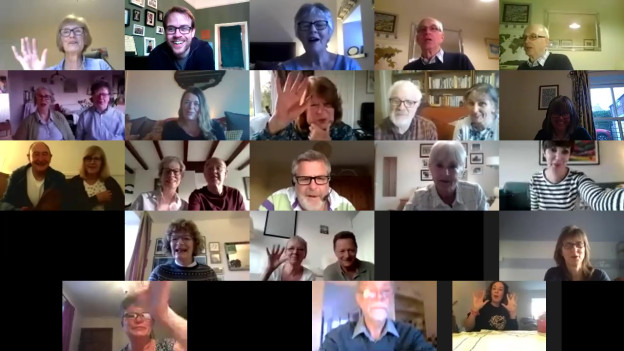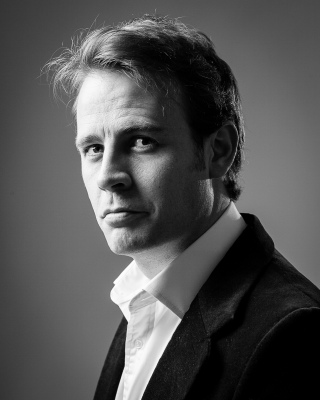
MAY was supposed to be an exciting month for the York Philharmonic Male Voice Choir and the Ryedale Voices.
“The Phil” were due to travel to Germany and Holland, as part of the choir’s 95th anniversary celebrations, to sing alongside choirs and singers with whom they have a friendship that spans more than 50 years.
On the other hand, Malton’s Ryedale Voices, led by Alison Davis, have only just passed their first anniversary. This month should have entailed performing their first full concert with Alison’s other choir, Harmonia, and Richard Kay’s small ensemble The Sound Fellows.
In the Coronavirus clampdown, these events, like so many, have had to be cancelled for now. However, this does not mean the choirs have suspended all activity.
Richard Kay, the Phil’s assistant musical director and Ryedale choir’s conductor, took it upon himself to keep the two choirs going through the lockdown period, helped enormously by Alison Davis and Helen Smith, the Phil’s accompanist, as rehearsals by Covid-19 2020’s de rigueur modus operandi, Zoom, started six weeks ago.
“The primary purpose was to tackle any potential feelings of isolation by keeping the choir members connected, but I was also keen to keep us all singing and to keep repertoire fresh,” says Richard. “That’s why, inspired by many other choir leaders across the country, I began to lead rehearsals for the two choirs over Zoom.”
The “virtual choir” experience is very different to normal rehearsals. The time lag between different internet connections “doesn’t allow you to sing together” and so Richard has been recording the separate parts for each of the songs, combining them in Audacity, and using these to sing along to over Zoom.
Although many of the singers are not particularly tech savvy, these boundaries have been overcome, and regularly 40 to 55 singers have been taking part at the Monday and Tuesday virtual rehearsals.
Aware that choral singers gain the greatest satisfaction from hearing themselves singing together, Richard initially invited the members of each choir to send him audio recordings of their individual parts for songs with which they were familiar.
“Encouraged by the positive responses from the singers and followers of the two choirs, and by a very positive reaction on social media, I decided that the next challenge should be to write, learn and record a video of a brand new song relevant to the current situation we find ourselves in,” Richard says.
“I wanted to keep the feeling of this song positive and so I composed a piece called Keep Singing. Over the next few rehearsals, we learned this song and were joined by singers from other choirs to make this a joint York-Malton collaboration between singers from the Ryedale Voices, the Phil, Harmonia, The Sound Fellows and the Scarcroft Parents’ Choir.”
For a direct link to the Keep Singing recording, follow this link: youtube.com/watch?v=318cfczHMIk&feature=emb_title.
“Whatever trials we will continue to face through 2020 and beyond, I would encourage everybody to Keep Singing,” urges Richard.

Six key questions for Richard Kay, set by Charles Hutchinson
Everywhere you look, singers have been quick to adapt to lockdown days by going digital for Zoom sessions etc. What would you put that down to, Richard?
“I can’t speak for everyone but one of my first thoughts was to try to continue rehearsals online for the choirs that I am involved with.
“It just so happened that both Ryedale Voices and York Phil were coming out of a period of learning new music and coming up to some big events: a festival in Whitby and a tour to Holland and Germany for the Phil and the first ever concert for Ryedale Voices.
“Both choirs were, therefore, in pretty good shape and very excited at the prospect of sharing our music when lockdown began. It would have seemed a great shame to lose the ‘match fitness’ over the prolonged lockdown and so we were keen to find alternative methods of keeping ourselves singing and keeping new repertoire fresh.
“However, there was a more important reason for me to look into this. For me, singing is a physical activity that greatly improves mental health. This, combined with the sense of togetherness that you get from being a member of a choir or group, was in danger of being severely impacted.
“With many members of our choirs needing to self-isolate and living in more remote areas, I wanted to get the choirs together to tackle those inevitable feelings of isolation and loneliness.
“Following on from that, I realised how many music groups were doing the same and I have thoroughly enjoyed watching the ‘virtual’ musical performances that so many have put together, so I thought, ‘why don’t we try one ourselves’. It has given us something to work towards and something to feel proud of.”
What challenges has it thrown up for you personally, creatively, technically, emotionally?
“I am no Luddite but equally I am not hugely knowledgeable when it comes to technical matters. The practicalities of running a choir rehearsal over Zoom were initially very daunting.
“I followed the recommendations of other choir leaders and sought advice from Jessa Liversidge but ultimately you’ve just got to give it a go yourself. I have been learning as I go along, but I have had the support of choir members who have also been grappling with new technology.
“The need to support others to join in with Zoom and, further down the line, to record and share their videos, has been quite time consuming. Then there has been the learning of the software for recording and compiling different tracks. I now have a new-found respect for the work of sound engineers in recording studios. #
“All of this has taken time, which in turn has impacted on home educating and childcare responsibilities, but I think it has been worth it. At a time when all my other work came to a stop it has been a good creative project to focus on.
“The strange thing about Zoom is that the choirs cannot all sing together. The time lag means that they can only listen and sing along at home. This does make it something of a one-man show for the choir leader but it has been a nice way to utilise my performance skills! For me personally, it has also been lovely to try out a spot of composition after many years.”
What repertoire has been rehearsed over the past six weeks?
“Rehearsals for the Phil take place on Mondays; Tuesdays for Ryedale Voices. Both run from 7.30pm to 9pm, with a Facebook live “social” for the following half hour on Monday nights for the Phil.
“We have managed a mixture of learning new songs, practising songs that were new to us to keep them fresh and singing through old favourites for the sheer enjoyment.
“For the Phil, this has included singing along to some of our CD tracks. For Ryedale Voices, I have been recording each part and combining them so that we have recordings to sing along to and singers are encouraged to highlight tricky bits for their sections – as well as pointing out bits that I have got wrong in my recordings!
“I have been lucky to be able to use the recorded piano parts sent to me by two very capable pianists in Alison Davis and Helen Smith, as well as asking Helen to play certain lines on her piano during the Zoom sessions.
“We have also had some time for chat and to sing a few renditions of Happy Birthday. For this alone, I have left all the members’ mics on but with the different time lags, the cacophony of many different versions of the song make it pretty entertaining.
“Repertoire for both choirs includes some sacred music, some arrangements of pop songs, songs from musicals and some rousing spirituals and freedom songs. As well as the Keep Singing track, look out for the Phil’s Lily Of The Valley and Ryedale Voices’ Siyahamba, also compiled during lockdown, on our Facebook pages.”
Why is singing such a positive thing to do, both individually and collectively?
Singing is generally a joyful thing to do, and we need that kind of positivity at the moment. I am aware that singing regularly around the house is usually an indicator that I am in a happier place.
“Similarly, if we make ourselves sing, even singing along to the radio, it tends to make us feel better. We can’t sing collectively at the moment, but it lifts the heart to see everybody singing during the Zoom rehearsals.
“We were still missing out on hearing ourselves singing together so a virtual track like Keep Singing has enabled us to hear ourselves together once again.”
Keep Singing, as a title, sounds like it does exactly what it says on the tin: perfect for positivity in such strange times. Discuss…
“Yes! I wanted to ensure that we all kept singing first and foremost but this then inspired the writing of the song. There will be many creative people making artistic responses to the Coronavirus pandemic and while I wanted to write a song inspired by the current situation, I didn’t want to make it downbeat.
“As I say, singing is a joyful experience and so I wanted to make it a joyful song. The fact that we have made it a collaboration between different choirs is also very appropriate.
“The Ryedale Voices were due to perform a joint concert in May with Harmonia and a small ensemble I run called The Sound Fellows. While this didn’t happen, I realised that anybody from any choir could join the Zoom rehearsals – one of the advantages of being stuck in your own living room – and so why not open it out to more singers?
“I have been helped hugely by Alison Davis, who runs Harmonia, and the Ryedale Voices, Helen Smith (accompanist of The Phil), and Dave Todd from the Phil, who managed to compile all the separate videos into a Zoom-like grid for me.”
What would the singing groups be doing in the summer ahead, were it not for the Covid-19 pandemic?
“The Phil were due to be in Germany and Holland in May and then had a number of concerts lined up before their summer recess, including their ever-popular Summer Concert at the York Citadel. It seems strange that instead our minds are now turning to Christmas!
“The Ryedale Voices were hoping to capitalise on their first concert at the end of May with a recruitment drive – especially for any Malton-based men – and then who knows!
“To be honest, we just can’t wait to get back into a rehearsal room together but we are concerned about how long it may be before a large group of singers – many of whom fall into vulnerable categories – can all get together again.”
